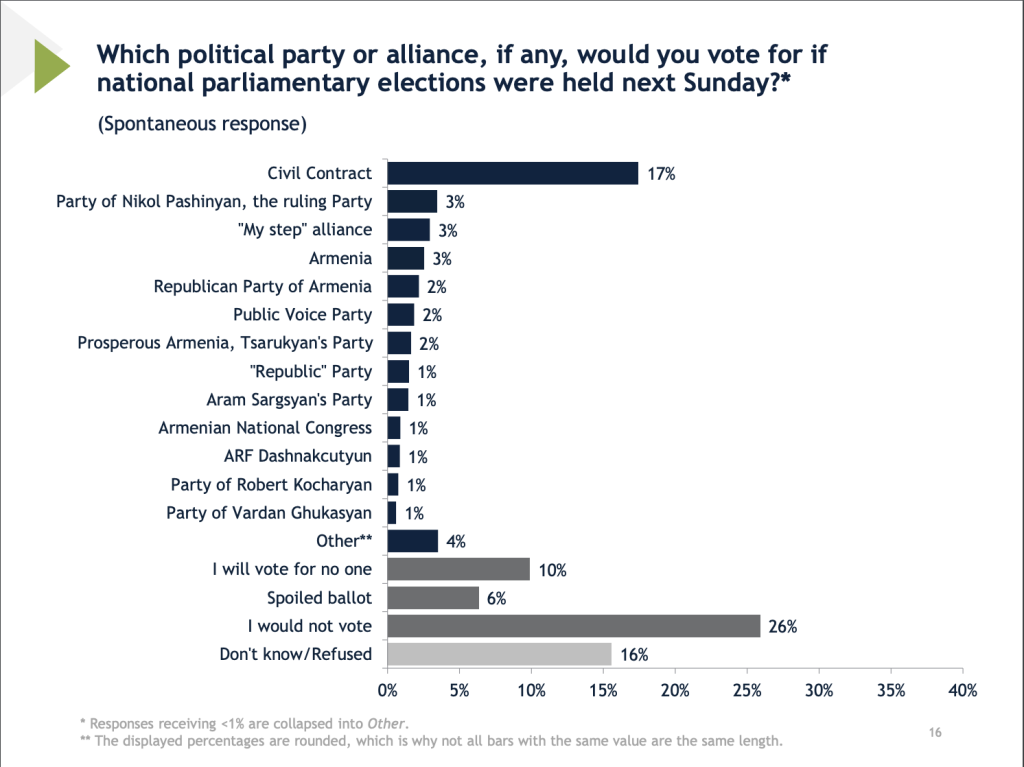By Mark Dovich
Public opinion on Russia is growing increasingly unfavorable in Armenia.
That is according to a new survey, out this week, from the International Republican Institute, a United States-based nonprofit with a long history of polling in Armenia.
Surveyors conducted telephone interviews with a representative sample of over 1,500 adults across Armenia last December. The survey results have a 2.5% margin of error.
Armenians turning their backs on Russia
For the first time, a majority of Armenians — two-thirds of those polled — said they considered their country’s relations with Russia “somewhat or very bad.” Strikingly, that figure was in the single digits less than five years ago.

Only Azerbaijan, Israel, and Turkey were rated more negatively than Russia, out of the dozen regional and global powers included in the survey.
Still, nearly half of those polled acknowledged Russia remains Armenia’s most important economic partner, even as most pointed to France, Iran, and the United States as their country’s main political and security partners on the world stage.
National security, economic wellbeing at top of mind
Most Armenians continue to name “national security and border issues” as the most pressing issue facing their country.
Meanwhile, when asked to identify the most important problem facing their household, respondents most often selected bread-and-butter issues, like high unemployment and low wages.
To that point, the majority of those polled described their family’s economic situation as “having enough money for food and clothes, but not enough money to buy expensive things.” Only one in 20 respondents said their family “can afford anything we want.”
Low trust in politicians, government institutions
Crucially, however, most Armenians have little faith in their elected representatives’ ability to tackle those problems.
A whopping three in five respondents said they trusted no politicians in the country, and nearly half said they would not vote, vote against all candidates, or intentionally spoil their ballot if elections were held now. Only about one in five said they would vote for the ruling Civil Contract party, with every other party garnering 3% support or less.

Notably, the share of respondents who said Prime Minister Nikol Pashinyan had not had any successes in the past half year was greater than the portion that was able to name any policy achievement.
Public faith in key institutions also remains relatively low.
The army remains Armenia’s most trusted institution, with almost two-thirds of respondents saying they were “somewhat or very satisfied” with it. Still, that represents a massive drop from the nearly unanimous popularity the army enjoyed before Armenia’s disastrous defeat to Azerbaijan in the 2020 Nagorno-Karabakh war.
Conversely, Armenia’s parliament retained its spot as the country’s least trusted body, with almost seven in ten respondents saying they were “somewhat or very dissatisfied” with it.
Still, half of those polled said they believe Armenia is, overall, “heading in the right direction.” It marks the first time more Armenians have said their country is heading in the right direction than in the wrong direction in more than two years.
Accommodating displaced people from Karabakh
More than nine in ten Armenians say it is “somewhat or very important” for the Armenian government to continue to be involved in efforts to help the more than 100,000 Armenians who were forcibly displaced from Nagorno-Karabakh last year.
To that end, nearly three in four said they were “somewhat or very satisfied” with the government’s work in that direction so far, while noting that the lack of quality housing remains the most pressing problem facing Nagorno-Karabakh’s Armenians.
For many Armenians, this is personal. One in four respondents said they had relatives or friends from Nagorno-Karabakh who fled their homes last year.
The post Views of Russia increasingly negative in Armenia, new survey says appeared first on CIVILNET.
















